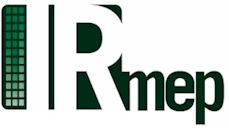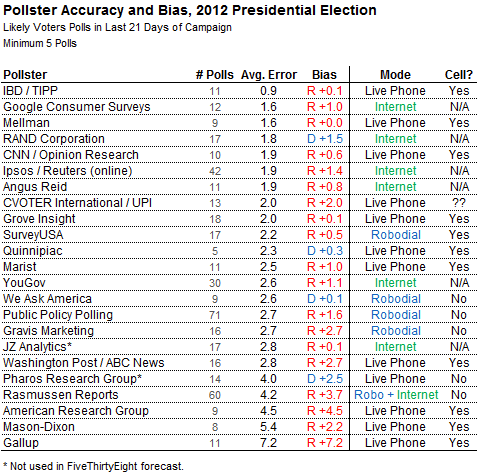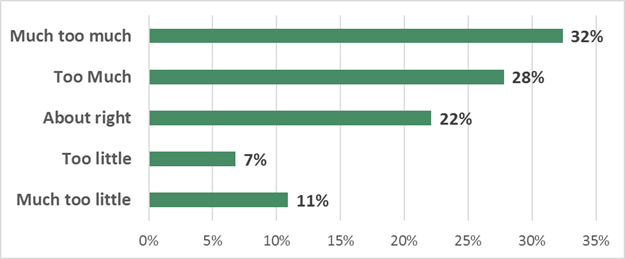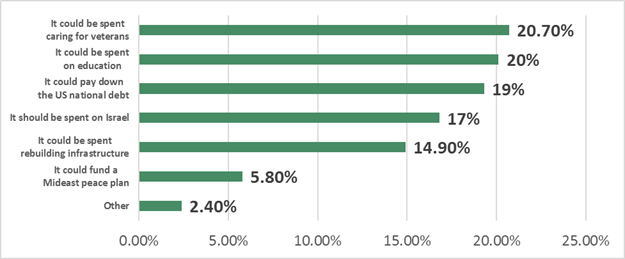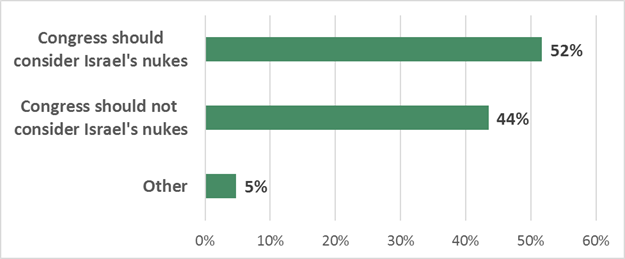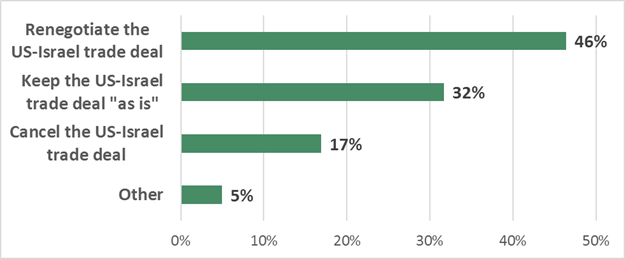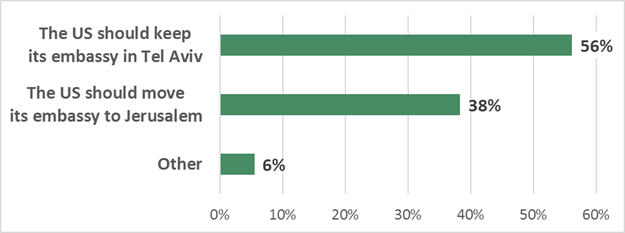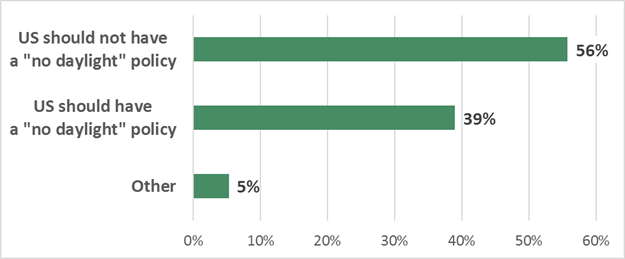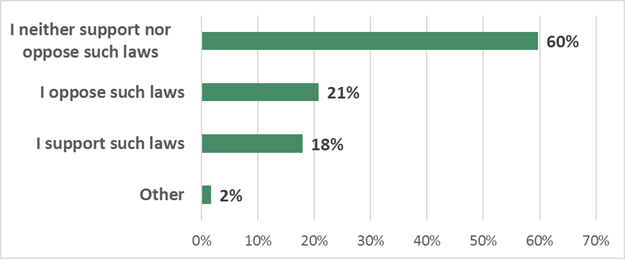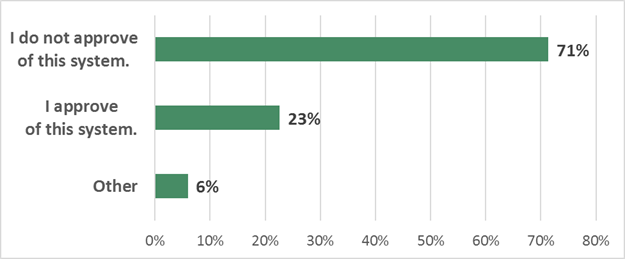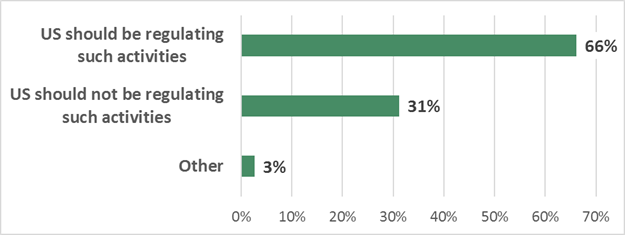 |
American attitudes about Israel/lobby programs - 3/26/2017Surveys fielded through Google Analytics Solutions Principal Investigator: Grant F.
Smith Director of the Institute for
Research: Middle Eastern Policy, Inc
Most of the following first presented at: “The
Israel Lobby and American Policy” conference at the
National Press Club on March 24, 2017 Introduction
Public opinion polling is important, but little of it
accurately measures what the American public thinks about
key Israel/lobby issues.
This survey series begins to fill in that information
deficit.
Focused, accurate polling should guide elected
representatives, who can then act in the broader public
interest. Polling about Israel lobby programs reveals a
large gap between US government actions demanded by the
lobby and policy outcomes the public prefers.
The Israel lobby’s growth, size, composition and division of
labor has become better understood since the disastrous US
invasion of Iraq (which the lobby quietly supported) and the
more recent battles over the Iran nuclear deal (JCPOA)
signed by the Obama administration (which the lobby
publicly, though unsuccessfully, opposed). This report uses
the neologism “Israel/lobby” to express the oftentimes
simultaneous public relations campaigns and lobbying
programs pursued by the Israeli government in coordination
with top advocacy organizations lobbying for Israel within
the United States. Key US organizations include the American
Israel Public Affairs Committee (AIPAC), the American Jewish
Committee (AJC), the Zionist Organization of America (ZOA)
and the Anti-Defamation League (ADL). Hundreds more,
including a small number of evangelical Christian
organizations, play a role within a vast ecosystem that
demands unconditional US support for Israel.
In the year 2012 the nonprofit wing of the Israel lobby
raised $3.7 billion in revenue. They are on track to reach
$6.3 billion by 2020. Collectively they employed 14,000 and
claimed 350,000 volunteers. However outside data suggests an
estimated active membership of only about 774,000.[1]
This nonprofit foreign interest lobby, along with an
overlapping political campaign contribution infrastructure
not counted in the figures above, provides Israel with the
US support among members of the Congress and other key
influencers that purely American interests would not. This
lobbying prowess goes on display as 15,000 AIPAC members
gather at their annual policy conference every March, after
which many visit their representatives on Capitol Hill to
demand compliance with an increasingly costly legislative
agenda.
What Americans think about the methods by which this is
achieved, the enormous costs and the outcomes is the subject
of this report. Methodology
The questions were fielded individually using the most
accurate survey technology in America today: Google
Analytics Solutions. This platform was used to accurately
forecast the 2012 presidential election winner’s margin of
victory at 2.3 percentage points. The actual margin was 2.6%
based on tallied ballots. Google taps into an immense pool
of adult internet users with known demographics. Google’s
vast
representative sample has opened the world of accurate
polling to a broader user base. Polling guru Nate Silver
claims,
“Perhaps it won’t be long before Google, not Gallup, is the
most trusted name in polling.”[2]
The following survey questions were fielded on the cited
date. Unlike most polls, anyone may visit the hyperlinks to
Google Analytics Solutions to examine and download the raw
response data. What Americans Think about Israel/lobby Programs
The Israel/lobby’s most important program is obtaining
unconditional US foreign aid
including advanced American weaponry and a hefty sum of cash
for Israel’s export-oriented military industry. This US
support is packaged into 10-year “memoranda of
understanding” or MOU’s. However, the Israel/lobby asks for
and usually gets additional ad hoc aid packages above
guaranteed MOU sums. Passing annual aid legislation requires
keeping the issue of Israel’s nuclear weapons program off
the table.
The US has provided $254 billion in known foreign aid to
Israel, more than any other country. There have been recent
attempts, most notably by Professor Hillel Frisch, to try to
move the goal posts and claim that Japan, Germany and South
Korea are, in fact, bigger recipients. But this argument is
misleading. Japan, Germany and South Korea are in a
different category: treaty-bound allies. The military
alliance expenditures, with contributions by both sides,
also carry mutual obligations. This makes such alliance
expenditures, much in need of reassessment, not usefully
comparable to US aid to Israel.[3]
The US has no treaties with Israel, which often takes
actions the US opposes.
When informed of its relative size, 60% of Americans believe
that US foreign aid to Israel is either “much too much, or
too much.” This has been consistent in recent years, with
polls from 2014, 2015 and 2016 revealing similar levels of
disapproval.
Question: Israel & its US lobby demand & receive over $3
billion annually (9% of the foreign aid budget and more than
any other country) from Congress and the president. The
amount is:
Americans responding to this question were informed that aid
has been approximately 9% of the total US foreign aid
budget, but this question will have to change in future,
since the Trump administration proposes cutting much of the
State Department budget while leaving aid to Israel
untouched.
The most recent MOU signed on September 14, 2016 guarantees
Israel $38 billion over the next ten years, and even more in
the event of armed conflict, which Israel could well be
incentivized to start.[4]
The American public is often told that this aid guarantees
Israel’s “qualitative military edge” over rivals, through
the Israel/lobby demands that Israel’s nuclear weapons
program never be included in this discussion.
Question: The US just agreed to provide $38 billion in
military aid to Israel over the next ten years. In your
opinion, how could this money be better spent?
https://surveys.google.com/view?survey=ofnzock6bg3vasel7nkfdzdwwy
However, when asked the question presented above immediately
after the last MOU was signed, 60% of Americans had higher
priorities, including spending on care for US veterans,
spending on education and paying down the national debt.
Only 17% thought the funds should be spent on Israel.
When Congress passes aid spending bills and presents them to
the president, who signs them into law, both rely on the
subterfuge that the US does not, and indeed cannot, know
whether Israel has nuclear weapons. However, under the Arms
Export Control Act, certain procedures must be followed
whenever the US gives foreign aid to known nuclear weapons
powers that have not signed the nuclear nonproliferation
treaty. In
2012, under increasing pressure, the Obama administration
passed a gag order[5]
that punishes any federal employee or contractor who speaks
about what most people already know, that Israel has a
clandestine nuclear weapons program.
Question:
Israel & its US lobby want Congress to finance Israel's
"Qualitative Military Edge" over rivals without considering
Israel is the region's sole nuclear power.
https://surveys.google.com/view?survey=3p2rcyl6aabvut3qtdwaccvyou&question=1&filter=&rw=1&org= Field date: 03/10/2017
Most Americans would prefer an honest discussion about
Israel’s nuclear weapons, and 52% said Congress should take
the nukes under consideration. Officially, Congress has said
it does not take a position on this matter. But under
pressure of recent legal action to block US aid to Israel
over its nuclear weapons program, and dogged reporting, this
could begin to change.[6]
In 1985, the Israel/lobby was the primary force behind
providing preferential US market access to Israeli
exporters. This was later rebranded as American’s first
“free trade” agreement. Because US industry and labor groups
were united in opposition to the deal, an Israeli Embassy
operative covertly obtained and passed a 300-page classified
report compiled from proprietary industry data from the
International Trade Commission to AIPAC to help it overcome
organized opposition. This was investigated as a
counter-espionage matter by the FBI, but was later dropped
when the Israeli Embassy official, Dan Halpern, claimed
diplomatic immunity.[7]
The trade preferences replaced a balanced trading
relationship with a chronic deficit to the United States. On
an inflation-adjusted basis, it is America’s worst bilateral
trade deal with a cumulative deficit of $144 billion
dollars.[8]
Question: Israel & its US lobby were key proponents of a
1985 free trade deal that produces the largest cumulative
deficit of all bilateral agreements. The president should:
https://surveys.google.com/view?survey=qyocqwcto7kni6v46dxuhzao7m&question=1&filter=&rw=1&org=
In this era of popular discontent with proposed trade deals
such as the Trans-Pacific Partnership and existing NAFTA,
when informed of the poor performing US-Israel trade deal,
63% of Americans would either renegotiate or cancel it
altogether.
Another long-term Israel/lobby initiative is moving the US
Embassy to Jerusalem.[9]
Since 1948, Israel has been attempting to persuade foreign
embassies to relocate to Jerusalem. The original partition
agreement declared the city must be internationalized.
Leveraging Bob Dole’s presidential aspirations, in 1995 ZOA
and AIPAC championed a law that defunds U.S. State
Department overseas construction budgets unless the U.S.
embassy is moved. Presidents
have refused to do it by exercising waivers included in the
law to overcome separation of powers issues. However, there
are now many champions of the embassy move inside the Trump
administration, which may refrain from exercising waivers to
stop a move when the decision is due in June of 2017.
https://surveys.google.com/view?survey=ormiayhumabr4zzosnvu3wvmqi&question=1&filter=&rw=1&org=
Americans are not excited about the move. When informed,
“Israel’s US lobby wants the US Embassy in Israel moved from
Tel Aviv to Jerusalem. No other country, in accord with UN
resolutions opposing such a move, has done this,” 56% of
Americans indicate the embassy should not move, while 38%
say that it should.
There is also a renewed push to have a policy of “no
daylight” between the US and Israel. This policy,
particularly as championed by former Israeli ambassador to
the US Michael Oren, means “the US and Israel can disagree,
but not openly” since that “encourages common enemies” and
“renders Israel vulnerable.”
Such a policy mainly benefits Israel, which then leverages
the appearance of unconditional US support in its own
foreign relations.
Question:
Israel & its US lobby want a "no daylight" policy of the
president never openly criticizing Israeli settlements,
giving Israel billions in aid, & diplomatic support at the
UN
Israel and its US lobby are, once again, the only major
parties making this demand, but 56% of Americans believe
that their country should not have such a policy.
There is also an intense Israel lobby campaign to make the
work of American Boycott Divestment and Sanctions (BDS)
supporters unlawful in the US.
The BDS movement works to end international support
for Israel's oppression of Palestinians and pressure Israel
to comply with international law. Tactics include persuading
high profile entertainers and others to cancel participation
in events held in Israel/occupied territories, declarations
of solidarity with Palestinians, and academic, cultural and
business boycotts. Israel/lobby organizations accuse BDS
activists of anti-Semitism, and work to pass state and
federal anti-BDS laws. The Israel/lobby also appears to
engage in joint private corporation/front group Israeli
intelligence-agency “dirty tricks” to stop BDS.[10]
Question: Israel & its US lobby support federal and state
laws opposing US grassroots efforts to boycott, divest and
sanction Israel over its treatment of Palestinians.
https://surveys.google.com/view?survey=2ktegybtr6kkw6laod4rid4yga&question=1&filter=&rw=1&org=
60% of Americans neither support nor oppose such laws, with
21% opposing them and 18% supporting anti-BDS laws.
Most Americans strongly oppose the tactic of single-issue
lobbying on behalf of a foreign country. This is perhaps the
most important survey series finding, because it gets to the
heart of the current means by which the Israel/lobby has
accumulated influence: coordinated campaign contributions.
The system ranges from seed-funding political candidates and
campaigns, candidate funding through coordinated stealth
Political Action Committees (PACs),[11]
bundled campaign contributions, and huge sums injected into
races by pro-Israel mega donors.
Question:
Many US lobbyists, nonprofit organizations & individuals
steer campaign contributions to incumbents & sitting members
of Congress solely on the basis of support for Israel.
https://surveys.google.com/view?survey=geviobsuwb5ezqy6o7mmcawhou&question=1&filter=&rw=1&org=
A strong majority, 71% of Americans, do not approve of this
system. They are
likely unaware, however, about why lobbyists and supporters
of Israel now publicly talk about supporting the “US special
relationship with Israel” rather than Israel itself. There
are legal reasons.
The original lobby leaders, such as Abraham Feinberg and
AIPAC founder Isaiah Kenen, were far more forthright. They
honestly stated the goal was obtaining weapons, money,
diplomatic support because Israel needed it, rather than
because America needed Israel. Both were subsequently
pursued by the Department of Justice to register under the
Foreign Agents Registration Act of 1938 (FARA). Their
preferred method for obtaining guns and money was by
providing campaign funding to US politicians in exchange for
casting their votes on aid legislation. A 1962-1963 Senate
investigation revealed that AIPAC indirectly received
foreign startup money to lobby and engaged in massive
stealth US public relations campaigns.[12]
Today, the tight coordination between the Israeli government
and US groups continues. However, the PR frame has been
changed to “preserving the special relationship” and “common
values.” By 1970, no matter what the Israel/lobby did, the
Justice Department refused to pursue important questions
about whether some Israel lobby actors were in fact foreign
agents who should be regulated under FARA. Since 1970
several espionage investigations of AIPAC, and one known
counter-intelligence investigation of the ADL, were quietly
closed for no perceivable reasons. The final year the
Department of Justice appeared to take an interest in the
Israel/lobby as a foreign agent enforcement challenge was
1970.
Question: Until 1970 the US enforced laws requiring public
disclosures when Israeli government & surrogate programs
sought to influence US public opinion and lobby Congress
https://surveys.google.com/view?survey=q24vsudsvm52awhmwlfz2obw34&question=1&filter=&rw=1&org=
Today, most Americans appear to support a return to a
simpler time when Israel’s foreign agents were compelled to
comply with disclosure laws. Before 1970, organizations such
as AIPAC did not hold as much power over elected officials
and AJC officials were not treated like US diplomats by
foreign governments. Today 66% of Americans favor a return
to regulating AIPAC and other Israel/lobby group activities.
This may be due to more numerous establishment media reports
about coordinated Israeli government and Israel/lobby
programs using covert operations to achieve their objectives
targeting members of the US Congress.[13]
It could also be due to highly critical alternative media
reporting about how Israel/lobby programs harm Americans.
Conclusion
Solid majorities of Americans do not approve of major
Israel/lobby programs, how they are won, and the vast amount
of unconditional US diplomatic commitments and funding they
consume. However, only by transforming into active
opposition, rather than passive opposition, will Americans
be able to get their government into the business of
representing them, rather than the small—but unquestionably
influential—Israel/lobby. For news media and analysts to be
taken seriously, they must begin to discuss the Israel/lobby
as the primary force behind outcomes most
Americans—quantifiably—oppose.
[1] Grant F.
Smith, Big
Israel: How Israel’s Lobby Moves America, IRmep,
Washington, DC, 2016
[2] Nate Silver,
“Which Polls Fared Best (and Worst) in the 2012
Presidential Race” FiveThirtyEight, November 10,
2012
[3] Grant F.
Smith “$254 Billion in Unconditional US Aid to
Israel is Unique” Antiwar.com, February 23, 2017
[4] Grant F.
Smith “US Aid Package to Israel Incentivizes War”
Antiwar.com, January 2, 2017
[5] “Guidance on
Release of Information Relating to the Potential for
an Israeli Nuclear Capability” Classification
Bulletin WNP-136, September 6, 2012
[6] Britain
Eakin, “On Eve of Aid Boost, Researcher Flags
Israel’s ‘Clandestine’ Nukes” Courthouse News
Service, August 20, 2016
[7] “FBI
Investigates AIPAC for espionage and theft of
government property in 1984” The Israel Lobby
Archive, IRmep, Washington, DC
http://www.israellobby.org/economy/default.asp
[8] Grant F.
Smith “bilateral US-Israel “free” trade agreement
delivers $144 billion deficit to US” Centre for
Research on Globalisation, May 13, 2016
[9] Grant F.
Smith “Poll: Most Americans don't want US embassy
moved to Jerusalem Candidates keep making the
promise to get elected” IRmep, January 30, 2017
[10]
Al Jazeera Investigations, “The Lobby”
http://www.aljazeera.com/investigations/thelobby/
[11] Richard H.
Curtiss “Stealth PACS: Lobbying Congress for Control
of U.S. Middle East Policy” American Educational
Trust, Washington, DC, 1991
[12] “Activities
of Nondiplomatic Representatives of Foreign
Principals in the United States” Hearings of the
committee on Foreign Relations, US Senate, May 23,
1963.
[13] Adam Entous
and Danny Yadron, “US Spy Net on Israel Snares
Congress”
Wall Street Journal, December 29, 2015
|
